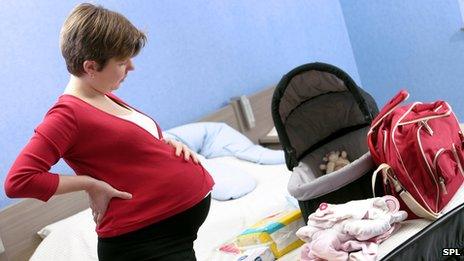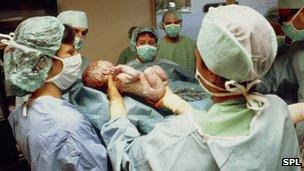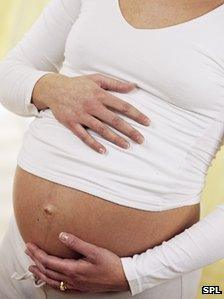Are women with a fear of childbirth being supported?
- Published

Preparing for the birth of a child can be very traumatic for some women
Most women feel a little anxious about giving birth, especially for the first time, but for some childbirth can be intensely frightening and traumatic.
Rather than looking forward to the arrival of their baby, they have a morbid fear of pregnancy and the birth process. Labour wards can feel like 'torture chambers' and they feel their only option is to have a Caesarean section.
Although the problem is thought to affect up to 10% of women, NHS midwife counsellor Zara Chamberlain told the Royal College of Midwives conference this week that tokophobia or a fear of childbirth is not well-recognised by doctors and midwives.
She said there should be an expert in the field at each hospital to support these women through their pregnancies.
Tokophobia can be caused by various different factors including a fear of pain, past experience of a difficult childbirth, depression and even sexual trauma.
Women whose phobias occur after a traumatic delivery are likely to have experienced severe pain or tearing during the birth or witnessed their baby in serious distress.
As a result, when they become pregnant again, they often cannot face the prospect of a vaginal birth and want to have their baby by Caesarean section instead.
No control
At Liverpool Women's Hospital, consultant midwife Simon Mehigan helps women overcome these kinds of fears.
"There is a misconception that it's all women who are too posh to push. But the vast majority are women who have had babies before.
"They think about what happened last time - when they had no control - and it makes them very fearful."
His approach is to see them regularly during their pregnancies, build up their confidence and unpick the causes of their fear.
"The key is not to say 'no' to a request for a Caesarean section," he says.
Instead, Simon spends time explaining the birth choices available and discussing the 'what ifs' so that they (and their partners) are not going into the experience blind.
Giving them the right information and support makes them feel in control and that can lead to a change of heart, he explains.
"The majority end up up opting for a vaginal birth rather than C-section. My desk is covered with cards from mums saying 'I'm so proud of myself for doing it'."
But that approach does not work for everyone.

Women with tokophobia often ask to have their baby delivered by Caesarean section
Deep fear
Studies show that in extreme cases, a small number of women abort their pregnancies rather than face the pain and trauma of childbirth.
For other women, the dread of childbirth starts in adolescence because of a traumatic birth they have seen or heard about - and this can lead to deep fears of hospitals.
Simon Mehigan says the tokophobic first-time expectant mothers he sees are frightened of having a complete lack of control over what is happening to them. They see a Caesarean as a way of regaining some of that control.
The Birth Trauma Association says it is regularly contacted by tokophobic women who want to have a Caesarean section, but are told they cannot.
Maureen Treadwell, co-founder of the support group, says whatever the cause of a woman's fear, it is vitally important they choose how the baby is delivered.
With maternity units across the UK under pressure to reduce their Caesarean sections rates, this can create issues but Treadwell says there are no grounds for argument.
"Caesareans don't cost much more than a vaginal birth - only £84. It's not a bad hit if a woman who is really afraid doesn't want to give birth vaginally."
Huge relief
Dr Malcolm Dickson, a consultant obstetrician at Rochdale Infirmary, agrees that Caesarean sections are often the best option for women who are terrified of delivering their baby for months beforehand.
"Birth phobia is a dreadful thing. You can't quantify it but I see women physically change and relax when I agree to a section.
"Lots of anxiety in the patient can lead to an emergency section during labour anyway."
Dr Dickson is currently carrying out research on a tool which he says could be used to measure a woman's anxiety levels about childbirth.
If all the bad experiences women have in labour could be eradicated then it follows that cases of tokophobia would reduce. But is that achievable?

Could there be a test for women going to have a difficult labour?
Prof Susan Wray, a physiologist at the Centre for Better Births at the University of Liverpool, is researching how the womb works in order to understand what is needed to make a good labour.
She examines biopsies of tissue from women who have had a difficult birth and compares them to tissues from a good birth.
"The womb is a muscle in the end. So what does it tell us? Maybe we could develop a test which could predict which women are going to have difficult childbirth."
'One-to-one care'
Maureen Treadwell of the BTA says women are regularly scarred by their experience of having a baby and the impact on their mental health should not be ignored.
"Some women are ending up in psychiatric units. Their lives have been changed so much by childbirth.
"We should ensure that women don't go through these experiences, being left for hours in labour, epidurals not working.
"There are some shocking stories."
The Royal College of Midwives has been campaigning for an increase in the number of midwives so that they can meet the demand for one-to-one midwifery care in maternity units.
Simon Mehigan acknowledges that this could transform many women's experiences.
"Every unit is facing the challenge of how to manage women in early labour, when they are in pain but not actually in labour. Having one-to-one care would make all the difference."